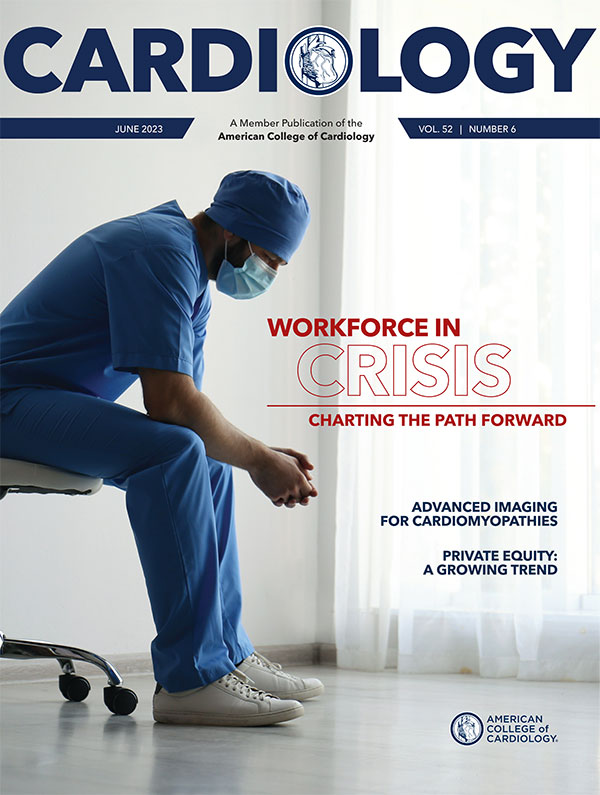Heart of Health Policy | Cardiologists Skeptical of Private Equity Benefits

Private equity investment in health care has significantly increased over the last 10 years, with the highest number of investments on record occurring in 2021 and 2022.
According to a February 2023 report by the Public Equity Stakeholder Project, a combination of factors has drawn private equity investors to certain health care specialties like dermatology, gastroenterology, dentistry, ophthalmology, podiatry and orthopedics over the years. Among the factors: "a permanent demand for health care services; an aging population defined by a high disease burden; and the fact that many subsectors within health care are fragmented and therefore ripe for consolidation."
Increasingly, these factors, coupled with an increase in the types of procedures shifting to outpatient settings, the ongoing shift to value-based care and a smaller number of existing private practices, are also drawing private equity investors' interest to cardiology.
An ACC survey conducted earlier this year found that most cardiologists had some degree of familiarity with private equity involvement in the acquisition of cardiology practices. While many indicated that they lacked a complete understanding of the topic and only a handful (7%) had ever been approached by a private equity firm about acquiring their practices, there was clear acknowledgment that the issue is on the rise. Similar results were observed among attendees at MedAxiom's recent Spring CV Transforum when they were asked a similar question during a focused session looking at the pros and cons of private equity.
Unlike the typical health system model that is oriented toward care delivery, clinical integration and long-term relationships, the private equity model is focused on specific clinical services with scalability and the ability to generate short-term returns over a period of five to seven years, according to Kris Shepard, senior vice president of clinical enterprise development at Atrium Health, who spoke at the MedAxiom meeting.

– Jerry Blackwell, MD, FACC
Shepard highlighted potential benefits of private equity, including that it can provide growth capital and help stabilize physician practices. In the ACC survey of cardiologists, almost two-fifths felt private equity could provide an outlet to ease the administrative burdens placed on cardiology practices.
Shepard also noted that physicians might see value in private equity due to future market uncertainty (and risk); the desire to build economies of scale (i.e., save on operating costs, increase investments in latest IT infrastructure, etc.), and the perception that private equity leaves an opportunity for continued "autonomy," whether that's maintaining physician practice groups, or offering "skin in the game" in rollover ownership models.
On the con side, however, private equity could lead to potential care model disruptions, drive procedures out of hospitals and negatively impact physician recruitment, according to Shepard. He also noted that, unlike health system models where longer-term relationships with the community are mission critical, the short-term, transactional nature of private equity models might mean limited reinvestment in the community.
Nearly half of cardiologists (47%) participating in the ACC survey echoed these concerns, expressing concerns about private equity ownership of cardiology practices having a negative impact on cardiologists working at those practices. Respondents noted that a relationship with private equity could lead to decreased physician autonomy, reduced job security, and would not provide a better work experience for clinicians and staff.
The biggest unanswered question, according to Shepard, is where the patient fits into the private equity dynamic. "While it could be harder to keep the patient at the center of a private equity model, there could also be a tremendous benefit," he said, especially given the acceleration of care delivery outside of hospitals and towards ambulatory surgery centers, etc.
Judging by the responses to the ACC survey, cardiologists are roughly split about the benefits to patients, with some suggesting that private equity ownership of cardiology practices would negatively impact the cardiovascular patients treated by those practices due to the increased focus on short-term revenue generation that could reduce the quality of patient care (57%) and have a higher likelihood of performing unnecessary procedures (51%). Of those surveyed, 43% also felt that private equity would increase costs to patients.

– Samuel O. Jones, IV, MD, MPH, FACC
Regardless of the pros and cons, it is clear that private equity is becoming an increasingly more significant player in the health care arena. While the majority of cardiologists say they are not likely to support the acquisition of their practice by a private equity firm, nor are they interested in any involvement with one, more and more of these conversations are taking place. "Recognizing this, the ACC and MedAxiom are committed to furthering dialogue and engagement on this issue as it continues to gain momentum, whether as part of dedicated sessions at the MedAxiom CV Transforum and ACC's Cardiovascular Summit, membership surveys, webinars, and more," says MedAxiom CEO Jerry Blackwell, MD, FACC.
"Understanding the potential benefits and the potential pitfalls will hopefully help practices make informed decisions around private equity when and if the time comes," says Samuel O. Jones IV, MD, MPH, FACC, immediate past chair of the ACC's Health Affairs Committee. "It will also help us better advocate for and champion the needs of clinicians and patients under private equity models. As medical care continues to transform, ACC will follow this trend closely and ensure the right thing for patients and our members."
Keywords: ACC Publications, Cardiology Magazine, Cardiologists, Health Policy, Podiatry, Outpatients, Ownership, Ophthalmology, Ophthalmology, Gastroenterology, Dermatology, Private Practice, Acceleration, Cardiology, Cost of Illness
< Back to Listings

